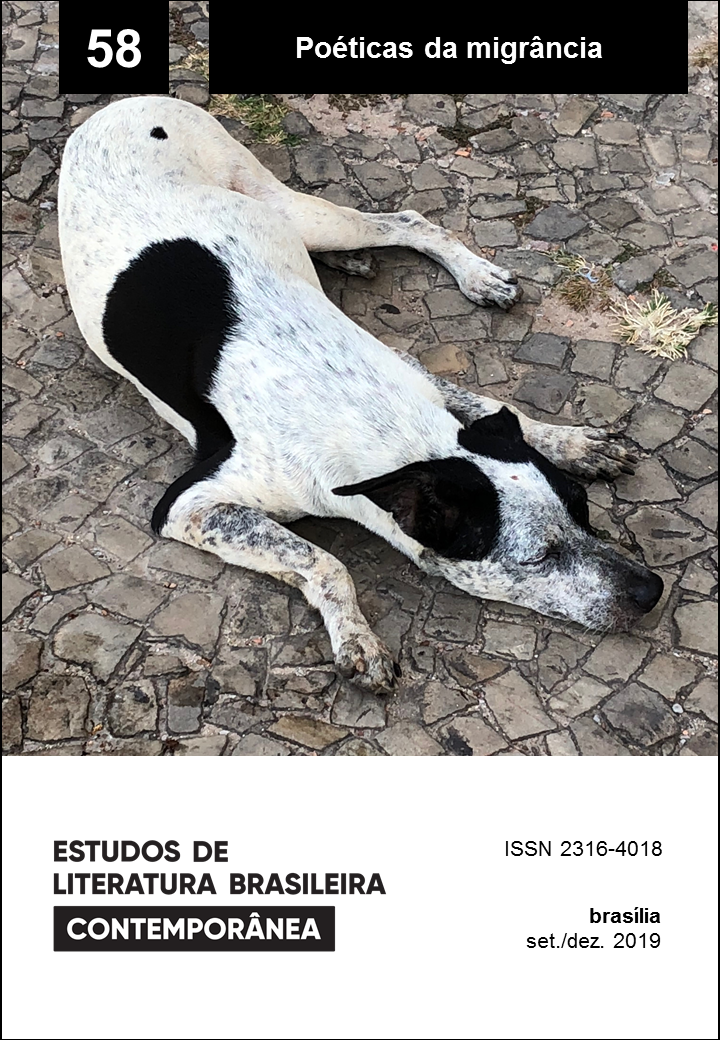In search of a land without evil: violence, migration and resistance in Kaká Werá Jecupé and Eliane Potiguara
DOI:
https://doi.org/10.1590/2316-4018587Keywords:
Brazilian indigenous literature, violence, migration, resistanceAbstract
This paper thematizes Brazilian indigenous literature produced since 1990s, looking specifically at the works of Kaká Werá Jecupé and Eliane Potiguara through the lens of historical violence, forced migration, loss of identity and the political struggle that is this literature’s central theme. The main argument to be sustained is that these writers are deeply shaped and impacted by symbolical-material violence to which they were subjected given our conservative modernization. As such, the fear of death, the pain felt over the loss of their territories and the negation of cultural identity, the nostalgic and melancholic memory of the destruction of their home and of their people, as well as the forced migration, the social misrecognition and invisibilization, the hunger and misery lived in the city peripheries, lead to the construction of an autobiographical, testimonial and mnemonic account of their ethnical-anthropological singularity and of colonial violence. Such violence is highly political and politicizing. Therefore, what can be concluded from reading and studying Brazilian indigenous literature is exactly this political sense undertaken by the literature itself through social criticism, cultural resistance, political struggle and pedagogical praxis, a literature that goes beyond fiction and assumes directly the role of critic, made by the victims from and for themselves.
Downloads
References
BANIWA, Gersem (2006). O índio brasileiro: o que você precisa saber sobre os povos indígenas no Brasil de hoje. Brasília: Laced/Museu Nacional.
DALCASTAGNÈ, Regina (2012). Literatura brasileira contemporânea: um território contestado. Vinhedo: Horizonte.
ESBELL, Jaider (2013). Tardes de agosto, manhãs de setembro, noites de outubro. Boa Vista: Edição do Autor.
ESCALANTE, Emilio del Valle (2015). Teorizando las literaturas indígenas contemporáneas. Raleigh: A Contracorriente.
FERNANDES, Florestan. (2008). A integração do negro na sociedade de classes. São Paulo: Globo, 2008.
GUAJAJARA, Sonia (2018). Sonia Guajajara. Organização de Kaká Werá. Coordenação de Sérgio Cohn e de Idjahure Kadiwel. Rio de Janeiro: Azougue.
HABERMAS, Jürgen (2012). Teoria do agir comunicativo: racionalidade da ação e racionalização social. São Paulo: Martins Fontes. v. 1.
JECUPÉ, Kaká Werá (1998). A terra dos mil povos: história indígena contada por um índio. São Paulo: Peirópolis.
JECUPÉ, Kaká Werá (2002). Oré Awé Roiru’a Ma: todas as vezes que dissemos adeus. São Paulo: TRIOM.
JEKUPÉ, Olívio (2002). Xerekó Arandu: a morte de Kretã. São Paulo: Peirópolis.
JEKUPÉ, Olívio (2009). Literatura escrita pelos povos indígenas. São Paulo: Scortecci.
KOPENAWA, Davi; ALBERT, Bruce (2015). A queda do céu: palavras de um xamã yanomami. São Paulo: Companhia das Letras.
KRENAK, Ailton (2015). Encontros. Organização de Sérgio Cohn. Rio de Janeiro: Azougue.
KRENAK, Ailton (2017). Ailton Krenak. Organização de Kaká Werá. Coordenação de Sérgio Cohn e de Idjahure Kadiwel. Rio de Janeiro: Azougue.
MUNDURUKU, Daniel (2012). O caráter educativo do movimento indígena brasileiro (1970-1980). São Paulo: Paulinas.
MUNDURUKU, Daniel (2016). Memórias de índio: uma quase autobiografia. Porto Alegre: Edelbra.
POTIGUARA, Eliane (2018). Metade cara, metade máscara. Lorena: DM Projetos Especiais.
SÁ, Lúcia (2012). Literatura da floresta: textos amazônicos e cultura latino-americana. Rio de Janeiro: Eduerj.
SOUZA, Jessé de (2012). A construção social da subcidadania: para uma sociologia política da modernidade periférica. Belo Horizonte: Editora da UFMG.
TUKANO, Alvaro (2017). Alvaro Tukano. Organização de Kaká Werá. Coordenação de Sérgio Cohn e de Idjahure Kadiwel. Rio de Janeiro: Azougue. (Coleção Tembetá).
WERÁ, Kaká (2017). Kaká Werá. Organização de Kaká Werá. Coordenação de Sérgio Cohn e de Idjahure Kadiwel. Rio de Janeiro: Azougu.e (Coleção Tembetá).
Downloads
Published
How to Cite
Issue
Section
License
Authors who publish in this journal agree to the following terms:
a) The authors maintain the copyright and grant the journal the right of first publication, the work being simultaneously licensed under the Creative Commons Attribution License-Non Commercial 4.0 which allows the sharing of the work with acknowledgment of the authorship of the work and publication this journal.
b) Authors are authorized to enter into additional contracts separately, for non-exclusive distribution of the version of the work published in this journal (eg publish in institutional repository or as a book chapter), with authorship recognition and publication in this journal.
c) Authors are allowed and encouraged to publish and distribute their work online (eg in institutional repositories or on their personal page) after the editorial process, as this can generate productive changes, as well as increase the impact and citation of published work (See The Effect of Free Access).
d) The authors of the approved works authorize the magazine to, after publication, transfer its content for reproduction in content crawlers, virtual libraries and the like.
e) The authors assume that the texts submitted to the publication are of their original creation, being fully responsible for their content in the event of possible opposition by third parties.


